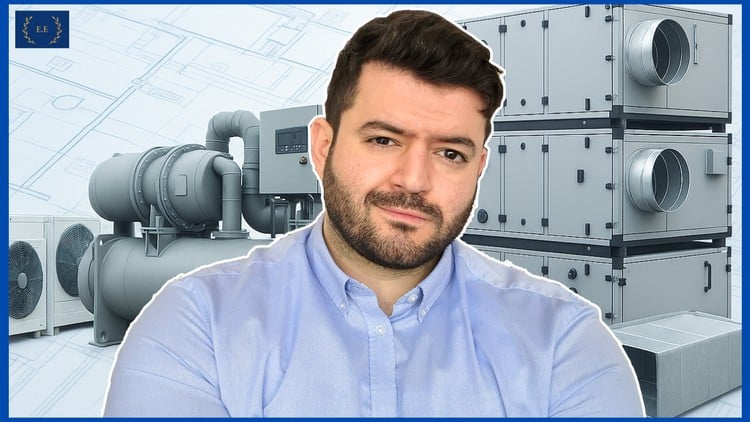
HVAC Design and HVAC Engineering Ultimate EXPERTS Guide to Air Conditioning Systems (HVAC Design Basics Course) – A to Z
⏱️ Length: 1.1 total hours
⭐ 4.43/5 rating
👥 13,769 students
🔄 May 2025 update
Add-On Information:
Note➛ Make sure your 𝐔𝐝𝐞𝐦𝐲 cart has only this course you're going to enroll it now, Remove all other courses from the 𝐔𝐝𝐞𝐦𝐲 cart before Enrolling!
- Course Overview
- Embark on a foundational journey into the intricate world of Heating, Ventilation, and Air Conditioning (HVAC) with this comprehensive beginner’s guide.
- Demystify the core principles that govern thermal comfort and indoor air quality in residential, commercial, and industrial settings.
- Gain a fundamental appreciation for the engineering disciplines that underpin HVAC system design and implementation.
- Explore the critical role of HVAC in modern infrastructure, impacting energy efficiency, occupant health, and building longevity.
- This course serves as an accessible entry point, translating complex technical concepts into understandable language for aspiring professionals and curious individuals alike.
- Discover the essential components and operational logic that drive effective climate control solutions.
- Understand the interconnectedness of heating, ventilation, and cooling processes and their synergistic effects.
- Acquire a solid knowledge base to confidently discuss and evaluate HVAC system options.
- This program is meticulously crafted to provide a robust understanding of HVAC design considerations from the ground up.
- It bridges the gap between theoretical knowledge and practical application, preparing learners for further specialized studies or entry-level roles in the HVAC industry.
- The course emphasizes clarity and conciseness, making it an ideal starting point for anyone looking to grasp the fundamentals of HVAC engineering.
- You will explore the evolution of HVAC technology and its continuous adaptation to meet emerging environmental and efficiency standards.
- Gain insight into the systematic approach required for designing and selecting appropriate HVAC solutions.
- This course is designed to foster a strong conceptual understanding of HVAC system architecture and functionality.
- Requirements / Prerequisites
- No prior experience in HVAC is necessary, making this course ideal for absolute beginners.
- A basic aptitude for problem-solving and logical thinking is beneficial.
- Familiarity with general building concepts and their functions would be helpful, though not mandatory.
- Access to a computer or tablet with a stable internet connection for accessing course materials and lectures.
- An eagerness to learn and engage with technical concepts.
- Open-mindedness to explore new technical terminology and principles.
- The ability to follow instructions and complete assigned exercises.
- A genuine interest in understanding how buildings are kept comfortable and healthy.
- Skills Covered / Tools Used
- Systematic Design Thinking: Develop the ability to approach HVAC challenges with a structured and analytical mindset.
- Component Identification: Learn to recognize and understand the function of key HVAC components like furnaces, air conditioners, heat pumps, and ductwork.
- Airflow Dynamics: Grasp the fundamental principles of air movement and distribution within a building.
- Heat Transfer Principles: Understand how heat is generated, transferred, and managed in various HVAC scenarios.
- Refrigeration Cycle Basics: Gain an introductory understanding of the thermodynamic principles behind air conditioning.
- Load Calculation Concepts: Learn about the factors that influence heating and cooling demands in a space.
- Ductwork Design Fundamentals: Understand the basic principles of sizing and routing air ducts.
- System Schematics Interpretation: Develop the ability to read and understand simplified HVAC system diagrams.
- Terminology Proficiency: Acquire a strong command of essential HVAC vocabulary and jargon.
- Basic Problem Diagnosis: Learn to identify common symptoms of HVAC system inefficiencies.
- Energy Efficiency Awareness: Understand the importance of energy-efficient HVAC design choices.
- Safety Considerations: Be introduced to general safety practices relevant to HVAC systems.
- Conceptual System Integration: Understand how different parts of an HVAC system work together.
- Basic Control Logic: Learn the fundamental principles of how thermostats and controls manage HVAC operations.
- Benefits / Outcomes
- Enhanced Building Knowledge: Develop a deeper understanding of how buildings are made comfortable and healthy.
- Informed Decision-Making: Gain the confidence to make better choices regarding home or office climate control.
- Career Exploration: Identify potential career paths within the HVAC industry.
- Improved Homeowner Skills: Become more capable of discussing HVAC needs with technicians or understanding basic maintenance.
- Foundation for Advanced Learning: Prepare yourself for more in-depth HVAC courses or specialized training.
- Increased Awareness of Indoor Air Quality: Understand the critical role HVAC plays in creating healthier indoor environments.
- Appreciation for Energy Consumption: Recognize the significant impact of HVAC systems on energy usage and cost.
- Ability to Communicate Effectively: Engage in more informed conversations about HVAC systems with professionals.
- Problem Identification Skills: Learn to recognize when an HVAC system might not be functioning optimally.
- Empowerment as a Consumer: Become a more knowledgeable consumer when selecting or servicing HVAC equipment.
- New Skill Acquisition: Gain a foundational understanding of a critical and in-demand technical field.
- Contribution to Sustainable Practices: Understand how efficient HVAC design contributes to environmental sustainability.
- Foundation for Smart Home Integration: Grasp the basic principles relevant to integrating HVAC with smart home technologies.
- PROS
- Highly accessible for individuals with no prior HVAC background.
- Provides a broad overview of crucial HVAC concepts.
- Excellent starting point for exploring a career in HVAC.
- Well-structured content for easy comprehension.
- Updated content ensures relevance.
- Large student base suggests high demand and positive reception.
- Positive rating indicates student satisfaction.
- CONS
- Due to its beginner focus, it may lack the depth required for advanced technical roles without further study.
Learning Tracks: English,Teaching & Academics,Engineering
Found It Free? Share It Fast!